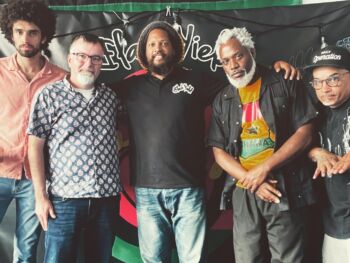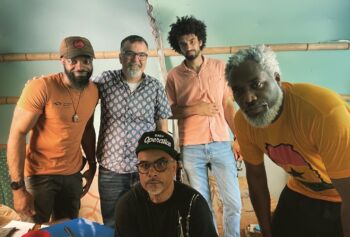August 9, 2023 Community Stories
A Creative Delivery of the History of Race and Racism
Michael Lawrence-Riddell has just been on a thousand-mile road trip when we speak to him. He and his team at Self-Evident Education are working on a new production and have been out in Pocomoke City, Maryland; Birdsnest, Virginia; Baltimore, Maryland; and Collegeville, Pennsylvania, interviewing Black community leaders and activists over the course of several days about the issue of land.

They are working on a series about a deep and contentious issue; Black land ownership, but when they are done with their production, it will be presented in a format that high school students will find engaging and easy to consume. Not an easy assignment.
This is how their website describes their work: “We support educators and students to think critically about the role of race and institutional racism throughout United States history. We create highly engaging, multimedia, educational tools that educators, students, and communities can use to critically engage in conversations to understand the histories and the legacies of systemic racism in the United States.”
So far, they have managed to live up to those words and have created highly acclaimed productions focused on race and racism in America. An example is their documentary, “If You Cross This Boundary, We All Die,” which tells the story of famed abolitionists Ellen and William Craft.
Lawrence-Riddell explains their current mission. “We’re in the middle of producing a three-part series about Black landownership and agriculture, so we were in Virginia at a small farm down there called Mighty Thundercloud Edible Forest. We met with their chief farmer, Thelonius Cook. And we’re looking at the big broad themes of what are the ways in which land ownership and access to land have often equated to wealth and political power in this country and the ways in which that wealth and political power has been systematically denied to African Americans…”

Self-Evident Education also organizes the Power of Truths Arts & Education Festival which pushes the theme of using education as a tool for helping to build communities “where justice and equity are the standards, not outliers.”
The second iteration of the festival took place in April this year at the Bombyx Center for Arts & Equity in Florence MA. It was made possible by support from the Community Foundation.
“One of the things that the grant from the Community Foundation really helped us to do was to organize the Power of Truths conference. This event brings together educators, community members, and youth, and really focuses on the intersections of art and education as tools for social justice.”
He also said that support from the Community Foundation will help Self-Evident Education to expand its work in all of Western Mass and build partnerships with more schools and communities.
“We’re planning some programming for the fall of 2023 and then the spring of 2024 centered around delivering content, critical thinking, and telling these important stories. It will also be this conduit for community connection, community extension, and community building work. The grant from the Community Foundation of Western Mass. has allowed us the space to do some of that thinking and initial infrastructure building to make that kind of program a reality.”
And what has the response from educators, students, and members of the public been to the work produced by Self-Evident Education?
Lawrence-Riddell says it’s been supportive, with a few exceptions; “It’s been almost universally positive. Sure, there are people out there who have negative things to say but all of the surveys and individual conversations that we’ve had have been positive.”
He gives an example: “We did some work in a fifth-grade classroom last week, and I gave the students a survey afterward. There was a question that was like, ‘Anything else you want us to know?’ One of the students wrote, ‘I think that it should be legally required for all fifth-grade students in the country to watch this film…”
And that right there is self-evidence.
